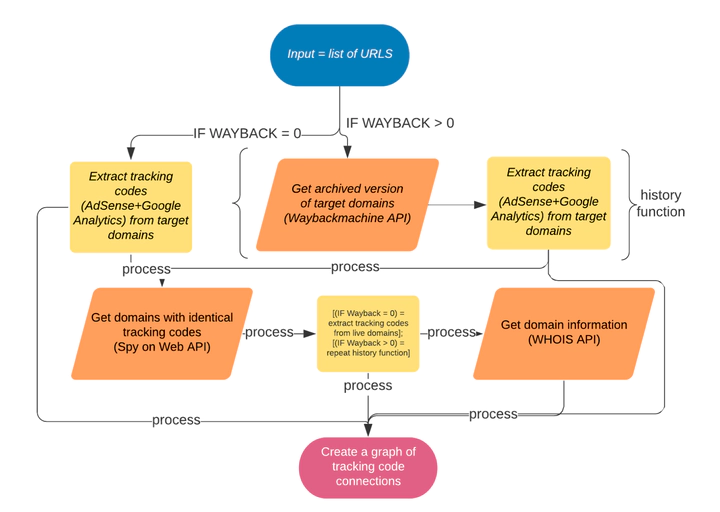Digital Politics and Government
 Overview of the website_connections script workflow
Overview of the website_connections script workflow
I am focusing on the security and governance challenges posed by social networking platforms and online disinformation ecosystems. My work addresses both the structural vulnerabilities of digital platforms and the societal responses required to mitigate their impact on democratic processes.
Platform Structures and Security Threats
I investigated the architectural vulnerabilities of social networking platforms, highlighting how these structures enable security threats such as computational propaganda and the proliferation of disinformation. Leveraging machine learning techniques, I focused on detecting and analyzing propaganda disseminated by bots, contributing to the understanding of automated influence mechanisms in digital spaces.
Mapping the Ecosystem of Untrustworthy Websites
My research also involved an in-depth qualitative and quantitative analysis of untrustworthy websites in Slovakia and Czechia, with a focus on their operational and financial mechanisms. Key contributions include:
-
Development of an Open-Source Tool: I co-created a tool to identify networks of untrustworthy websites based on shared Google Analytics/AdSense IDs, with the unique capability to analyze historical data. This tool was applied in a two-wave study to map the Slovak disinformation ecosystem, revealing that direct foreign control of these websites is minimal.
-
Qualitative Mapping of Ownership Structures: I identified the companies and individuals behind disinformation websites in Slovakia, arguing that financial incentives are the primary motivators for running these platforms.
-
Tech Stack Analysis and Regulation Proposals: I mapped the technological infrastructures (tech stacks) of untrustworthy websites and proposed a regulatory approach targeting these tech stacks as a means of mitigating their influence.
Digital Literacy and Capacity Building
I developed and co-developed a range of tools and educational resources aimed at raising digital literacy skills across diverse target groups. This included:
-
Toolkits and guidelines for understanding and countering disinformation.
-
Teaching materials tailored to the needs of educators, students, and professional groups.
-
An online learning course designed to enhance digital literacy among the Slovak armed forces personnel and other stakeholders.
Papers:
Hide and Seek in Slovakia: Utilizing Tracking Code Data to Uncover Untrustworthy Website Networks. (2021)
Examining the Tech Stacks of Czech and Slovak Untrustworthy Websites. (2022)
Slovakia: Snake Oil Spills Onto the Web. Report. (2019)
(Un)Trendy Japan: Twitter bots and the 2017 Japanese general election. (2019)
Selected Tools:
Open-Source Tool to identify networks of untrustworthy websites
Dezinformácie a konšpiračné teórie v masmediálnom priestore - teaching material for the Slovak Armed Forces
Fakespotting online course
Projects:
The Business of Misinformation - (Co-Investigator — country leader for Slovakia) - Funded by: Open Society Foundations
Cognitive Analytics for Real World Security Threats - (Deputy Principal Investigator) - Funded by: IBM
Possibilities of cognitive analysis of security threats on social networking services - (Co-Investigator) - Funded by: VEGA (Slovakia)
Fakespotting - (Co-Investigator) - Funded by: Erasmus+
COVID disinformation and their negative impact on ability to prevent the pandemic - (Deputy Principal Investigator) - Funded by: International Visegrad Fund